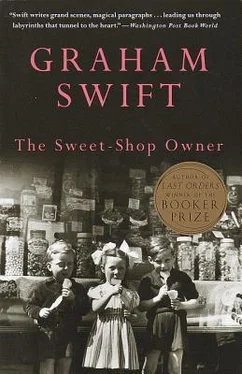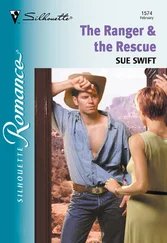Graham Swift - The Sweet-Shop Owner
Здесь есть возможность читать онлайн «Graham Swift - The Sweet-Shop Owner» весь текст электронной книги совершенно бесплатно (целиком полную версию без сокращений). В некоторых случаях можно слушать аудио, скачать через торрент в формате fb2 и присутствует краткое содержание. Год выпуска: 2012, Издательство: Vintage Books USA, Жанр: Современная проза, на английском языке. Описание произведения, (предисловие) а так же отзывы посетителей доступны на портале библиотеки ЛибКат.
- Название:The Sweet-Shop Owner
- Автор:
- Издательство:Vintage Books USA
- Жанр:
- Год:2012
- ISBN:нет данных
- Рейтинг книги:4 / 5. Голосов: 1
-
Избранное:Добавить в избранное
- Отзывы:
-
Ваша оценка:
- 80
- 1
- 2
- 3
- 4
- 5
The Sweet-Shop Owner: краткое содержание, описание и аннотация
Предлагаем к чтению аннотацию, описание, краткое содержание или предисловие (зависит от того, что написал сам автор книги «The Sweet-Shop Owner»). Если вы не нашли необходимую информацию о книге — напишите в комментариях, мы постараемся отыскать её.
The Sweet-Shop Owner — читать онлайн бесплатно полную книгу (весь текст) целиком
Ниже представлен текст книги, разбитый по страницам. Система сохранения места последней прочитанной страницы, позволяет с удобством читать онлайн бесплатно книгу «The Sweet-Shop Owner», без необходимости каждый раз заново искать на чём Вы остановились. Поставьте закладку, и сможете в любой момент перейти на страницу, на которой закончили чтение.
Интервал:
Закладка:
On Saturday mornings the High Street thronged. The same faces, down to the department stores and the new supermarket. Frozen food, electric mixers, long-playing records. Something new, something new in a shiny cover or a crisp cardboard box. And on the way back a call at Chapman’s, to pay the papers and buy the weekend’s tobacco. A drink in the Prince William. They had the juke-box now, and the television in the corner. Then football, a visit somewhere on Sunday. What randomness. ‘Don’t overdo it, will you Mr Chapman?’ But why should he mind? He only sold. Ceaselessly he filled his shelves and embellished his windows so their useless bounty might never fail. And when he knew what they whispered (echoes of Mrs Cooper’s gossip couldn’t escape him) — ‘He’s tied to that shop — Thinks of nothing else — Loves to rake it in’ — he didn’t mind. Let them whisper. Let them cast him in the miser’s role. He wouldn’t question it. For did they think it belonged to him, that cut-out behind the counter?
He watched himself fold the papers between his thumb and fingers; ring the till, swop pleasantries with customers, weigh up quarter-pounds and half-pounds in the scales; put the money in the safe at night, check the cash float, check the alarms, check the doors. Watched the figures mount in the maroon books. Watched himself drive home at night, briefcase and raincoat on the back seat, left at the traffic lights, up the Common Road, under the red chains of the sodium lamps. Watched himself construct his performance, as she watched herself, in the mirror, slowly being dismantled. Weakening of the lungs; a strain on the heart. That last holiday in Teignmouth — Dorry had found her solution by taking all her books with her to study. Going afterwards to Doctor Field’s. ‘She no longer has migraines, doctor.’ ‘That’s quite common, Mr Chapman, for a woman, er, at her time of life.’ He watched himself at night, listening to her laboured breathing, feeling his body temporarily recede, but seeing its daytime animation capering before him like some jerky phantom. And in the morning as he let Mrs Cooper in, drank the milky tea she brought him and heard her ask, ‘Mrs Chapman any better?’ he’d watch himself as he said: ‘No change.’
20
‘Know the latest?’
Smithy, working the pedal rather laboriously, winched him up, swathed in white, on the barber’s seat and wiped his comb and scissors. His old face was pale and his eyes yellowish in the mirror, and the fingers tucking the towel in his collar were cold.
‘Friend Hancock’s branching out.’
There was a smell of cologne and Brilliantine, adverts for razors and Durex. Two young assistants clipped at the other chairs and their faces seemed to be waiting, as Hancock and Joyce had once waited.
‘Had it from Schofield, and from the man himself.’
He bent closer to his ear. For Smithy’s art was the art of discreetly gathered and exchanged information. Didn’t they come to him, all of them, for their fortnightly clip — Simpson, Kelly from the Prince William, Ford the post-master, Schofield, Hancock? Only old Powell’s perpetually cropped hair was a mystery. And if things slipped out when they spoke, couldn’t Smithy be trusted, in return, to impart some useful snippet? But always with tact, always with disinterest. For what should Smithy care, piecing together the patterns of the High Street but going home at night to his spinster sister? Besides, he was old: his fingers were cold when they touched your neck.
‘He wants to open an office in Lewisham. The idea’s to move Joyce out there so he can rule the roost here. Head Office. Joyce won’t have any of it, and I don’t blame him — they’re supposed to be equal partners. They’re not exactly friends at the moment — I got that from Schofield. Cocky’s looking for a third partner so as to play things off.’
‘Lewisham?’
‘Empires start somewhere. He’s on the make. But he’s got wife trouble. Got this from Joyce. She does all right: everything on a plate. Schofield was describing their place. But she’s getting tired of being just one of the furnishings. Joyce says she’d do a flit on him if he didn’t buy her off.’
‘Stories.’
‘Who’s to say? Schofield says something could happen. She’s no longer exactly the belle of Sydenham Hill. We’re all getting on, pal.’
The clippers and the scissors snipped in silence. The barber’s pole twirled outside. Then Smithy said, picking up the comb, in a surer, routine voice as if the previous topic had never been raised: ‘Business all right?’ He nodded. ‘Irene?’ ‘No better.’ The fingers gripped his head and tilted it to one side: ‘Keep still now. Don’t you worry. Those doctors’ll come up with something. And Dorothy?’
He put the comb and scissors in his breast pocket and held the wooden handled mirror up to the back of his neck.
‘There. That’s you neat and trim for your customers.’ He put the mirror back on the hook on the wall. ‘I see Mrs Cooper’s having a nice little jaw about you to one of them.’ He cocked his eye towards the Briar Street window, where, across the wet road, through the gleam and clutter of the window display, Mrs Cooper could be seen, arms folded, talking to a woman in a navy coat.
‘Better go and live up to your publicity.’
Smithy took the towel from his collar and removed the sheet, scattering hair clippings to the floor. He got up from his seat. Then Smithy threw the sheet into the bin and, taking a brush from beside the sink, began brushing his jacket, twisting him slowly round on the floor with a slight pressure from his fingers, until he slipped the brush under his arm, put both his bloodless hands on his customer’s shoulders, and the two of them stared at their reflections in the mirror.
‘Know what I heard?’
There were five suits in the wardrobe. Five suits for a man who worked six and a half days out of seven. And he might have done his work in a shirt and a pullover or an old cardigan like Powell. But she insisted, bought him suits for Christmas and birthdays — what else should he need? — chose the material herself. So he hoisted on the red braces, in the dim, early-morning bedroom, tucked in his shirt — his stomach had begun to press against the line of his buttons — and tightened the maroon tie.
‘Know what Smithy told me?’
The tray with the tea cups was on the bedside table, next to her medicines and inhaler. The bedside lamp was on and she lay propped up against the pillows. In a little while, when he’d gone, she’d lie back; for often, after a restless night, she would only sleep in the early morning, in between his departure and Dorothy’s rising. But that was not before she’d got up, slipped on her dressing-gown and breakfasted with him at the kitchen table.
‘Hancock’s opening a new branch. In Lewisham. He’s looking for a third partner.’
‘Oh,’ she answered, as if she’d already had the information, noted it as she did those predictable columns in the newspapers. But she looked up, suddenly wary, so that he didn’t add at first, as Smithy had done, that all was not well between Hancock and Helen. Supposing she took that as a veiled allusion to themselves?
‘Empire building,’ he said and twanged the red elastic of his braces, like a clown, against his shirt. ‘Only a story, I expect.’
Every morning the tea, the hard light of the bedside lamp which showed the lines in her face; the electric fire in winter. Every morning he would dress and go down to prepare the breakfast — the shadowy forms of the garden would stare at him beyond the kitchen window — and he would scarcely need to glance at a clock or his watch to know whether he was on time. Up at five-thirty; out at six-fifteen. Put the cash books in the briefcase; polish shoes; warm the car engine. ‘Smithy says Hancock and Helen aren’t so hand in glove.’ And if he’d faltered once — sat down on the edge of the bed, torn the maroon tie from his neck that he’d tied so diligently —? But such mutinies could never have occurred, for her glance would have caught him before he slipped and fell: ‘Play your part.’ In the mirror his hair was thinning above the brow, it ran in black streaks over the scalp, and his face had assumed the moulded fleshiness of men — you saw them in the shop, asking for cigarettes, and lingering outside the Prince William — who carry their bodies around like so much ballast.
Читать дальшеИнтервал:
Закладка:
Похожие книги на «The Sweet-Shop Owner»
Представляем Вашему вниманию похожие книги на «The Sweet-Shop Owner» списком для выбора. Мы отобрали схожую по названию и смыслу литературу в надежде предоставить читателям больше вариантов отыскать новые, интересные, ещё непрочитанные произведения.
Обсуждение, отзывы о книге «The Sweet-Shop Owner» и просто собственные мнения читателей. Оставьте ваши комментарии, напишите, что Вы думаете о произведении, его смысле или главных героях. Укажите что конкретно понравилось, а что нет, и почему Вы так считаете.












